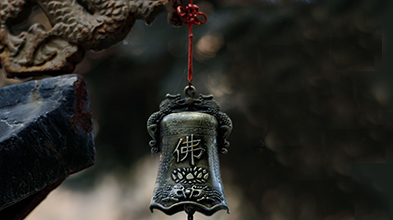Changing and Unchanging
Fo Guang Shan International Translation Center
©All rights reserved.
Written by Venerable Master Hsing Yun
Recorded by Leann Moore
- Changing and Unchanging 4:27
Changing and Unchanging
Changing and Unchanging
Everything within the universe is changing. We can say that what does not change in the world is change itself. Nature can be changeable and unchangeable. Things will either change or remain the same.
The “Sutra of the Forty-two Sections” says, “The world is impermanent, and the country is fragile.” A Song Dynasty scholar once said, “My life is only momentary” and “When we do not change our principles when viewing all phenomena, all things and self will have no end.” Tang Dynasty poet Li Bai once wrote, “Can you see the high mirror in the hall bemoaning my gray hair, which is black in the morning and snowy at dusk!” These illustrate all the changes in the world.
We may not detect any changes in the mountains, but they are always changing in endless ways. The sun rises and sets everyday, seemingly unchanged, but the reality is that the earth revolves to a different position every day. While the change of the four seasons happens the same way each year, in reality the four seasons of each year have different temperatures and scenery. We eat and sleep everyday—this does not change, but energy, spirit, mood, and external conditions are constantly changing.
Changing is not necessarily bad. Human relations, matters, and mind keep changing all the time. Change can be from bad to good. It can mean progress and hope as we change from less to more, from poor to wealthy, or from sick to healthy. However, things can also change for the worse. For instance, the downfall of a government, the breakdown of a marriage, the mutiny of troops, a change of heart, a change for the worse in health, drastic changes in the landscape, climate change, the passing of time, or the demise of a friendship.
We should not easily change our goals in life. However, the way to achieve our goals is to change according to circumstances. We can only survive with the ability to change and adjust, according to these circumstances. We need to change our methods of learning in order to adapt ourselves to a new society. Life that remains unchanged only leaves us stagnant.
However, as the social environment continues to change, our values may do the same. If we want others to change their impression of us, we need to transform ourselves. In order to compete in the market, we have to come up with new ideas to attract more business. Similarly, the management of corporations should be reassessed from time to time and renewed accordingly. We should bear in mind, however, people who change their minds easily often appear unreliable. Only by being honest in business, and not changing prices randomly, will we earn the trust of others.
Mountains, rivers, and the earth, even our home decorations, real estate values, and contracts, will all change. Only justice and truth remain unchanged. The lessons of history also remain unchanged. True love and a steadfast heart do not change. Furthermore: the truth of all phenomena going through the stages of existence, growth, decay, and extinction; the cycle of birth, sickness, aging, and death; and the cardinal truth of cause, effect, and karmic retribution, do not change. Our loyalty to our country, respect for our leaders, the pursuit of truth, and our inherent pure nature should not be changed.
We face the world’s myriad of changes with unchanging principles. We also change as the situation calls for adjustment so that we can move on in life. We can only hope that all things change when needed, and remain unchanged as warranted. For all that is benevolent and beautiful, we hope they remain unchanged; otherwise, if these things change from better to worse, then it is better that they not change at all.
What's New?
NOVEMBER

Humble Table, Wise Fare
INSPIRATION
Recorded by Leann Moore
Kind words-like cloth-
let people warm their hearts;
good words-like fine jade-
let people enjoy using them.

Dharma Instruments
Venerable Master Hsing Yun grants voices to the objects of daily monastic life to tell their stories in this collection of first-person narratives.

Sutras Chanting
The Medicine Buddha SutraMedicine Buddha, the Buddha of healing in Chinese Buddhism, is believed to cure all suffering (both physical and mental) of sentient beings. The Medicine Buddha Sutra is commonly chanted and recited in Buddhist monasteries, and the Medicine Buddha’s twelve great vows are widely praised.

Newsletter
What is happening at Hsingyun.org this month? Send us your email, and we will make sure you never miss a thing!





